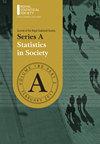回答“算法辅助人类决策的实验评价:在审前公共安全评估中的应用”讨论者。英国皇家统计学会杂志,A辑,即将出版
IF 1.5
3区 数学
Q2 SOCIAL SCIENCES, MATHEMATICAL METHODS
Journal of the Royal Statistical Society Series A-Statistics in Society
Pub Date : 2023-02-24
DOI:10.1093/jrsssa/qnad023
引用次数: 0
摘要
我们感谢皇家统计学会研究部为我们提供了一个宝贵的机会来展示我们的论文并收到许多学者的反馈。尽管他们的观点各不相同,但我们相信,我们所有的讨论者都认为有必要开发新的统计方法,以更好地分析算法辅助的人类决策。虽然算法的使用在当今社会已经变得无处不在,但我们人类仍然在算法的帮助下做出许多重要的决定。正如Kumar和VanderWeele所指出的那样,这种混合决策系统可能允许人们将人类的经验和知识与算法建议结合起来,从而可能导致改进的决策。此外,即使完全算法决策比混合系统更理想,我们可能仍然更喜欢后者,因为我们希望让人类,而不是算法,对决策的后果负责。算法辅助人类决策的重要性促使我们开发一套方法工具来评估和理解算法建议如何影响人类决策。正如Cruz cortsamz和Gosh所回应的那样,我们的研究与许多现有的研究形成了鲜明的对比,这些研究的重点是算法本身的准确性和公平性。我们希望其他研究人员跟进这一重要的研究议程。下面,我们就讨论者提出的具体意见作出回应。本文章由计算机程序翻译,如有差异,请以英文原文为准。
Reply to the discussants of “Experimental Evaluation of Algorithm-Assisted Human Decision-Making: Application to Pretrial Public Safety Assessment.” Journal of the Royal Statistical Society, Series A, Forthcoming
We thank the Research Section of the Royal Statistical Society for providing us with a valuable opportunity to present our paper and receive feedback from many scholars. Despite their diverse perspectives, we believe that all of our discussants are in agreement about the need to develop new statistical methodology to better analyze algorithm-assisted human decision making. While the use of algorithms has become ubiquitous in today’s society, we — humans — still make many consequential decisions with the help of algorithms. As Kumar and VanderWeele noted, such a hybrid decision-making system may allows one to combine human experiences and knowledge with algorithmic recommendations, possibly leading to improved decisions. Moreover, even if fully algorithmic decision-making is more optimal than a hybrid system, we may still prefer the latter because we want to hold humans, rather than algorithms, accountable for the consequences of decisions. The importance of algorithm-assisted human decision making motivated us to develop a set of methodological tools to evaluate and understand how algorithmic recommendations affect human decisions. As echoed by Cruz Cortéz and Gosh, our study sharply contrasts with much of the existing studies whose focus has been the accuracy and fairness of algorithms themselves. We hope other researchers follow up on this important research agenda. Below, we respond to specific comments raised by the discussants.
求助全文
通过发布文献求助,成功后即可免费获取论文全文。
去求助
来源期刊
CiteScore
2.90
自引率
5.00%
发文量
136
审稿时长
>12 weeks
期刊介绍:
Series A (Statistics in Society) publishes high quality papers that demonstrate how statistical thinking, design and analyses play a vital role in all walks of life and benefit society in general. There is no restriction on subject-matter: any interesting, topical and revelatory applications of statistics are welcome. For example, important applications of statistical and related data science methodology in medicine, business and commerce, industry, economics and finance, education and teaching, physical and biomedical sciences, the environment, the law, government and politics, demography, psychology, sociology and sport all fall within the journal''s remit. The journal is therefore aimed at a wide statistical audience and at professional statisticians in particular. Its emphasis is on well-written and clearly reasoned quantitative approaches to problems in the real world rather than the exposition of technical detail. Thus, although the methodological basis of papers must be sound and adequately explained, methodology per se should not be the main focus of a Series A paper. Of particular interest are papers on topical or contentious statistical issues, papers which give reviews or exposés of current statistical concerns and papers which demonstrate how appropriate statistical thinking has contributed to our understanding of important substantive questions. Historical, professional and biographical contributions are also welcome, as are discussions of methods of data collection and of ethical issues, provided that all such papers have substantial statistical relevance.

 求助内容:
求助内容: 应助结果提醒方式:
应助结果提醒方式:


